
By Adam Piraino
Switching to Remote Work
Back in March, on what seemed like the last day before the world changed, everyone in the office had their eyes glued to the TV. We were watching the market react to COVID-19. Despite the worst recession since 1987, the S&P 500 surged more than 9%. Phones were ringing off the hook with clients worried about their portfolios, or wanting to take advantage of the situation and put their money to work.
I stood there with the team, on the 37th floor of 150 North Riverside in downtown Chicago, absorbing news of the virus. Unlike my colleagues in the room, I was an MBA student at the Kellstadt Graduate School of Business—and an intern. I had been interning at William Blair since January, working on investment, market and economic research for client meetings and pitches, and helping make investment calls and manage business operations.
Over the weekend of March 14, the director of administration informed us that our office would be working remotely. The only problem for me, as an intern, was that company policy allowed only full-time employees to use remote access on secure client information/accounts and financial platforms. So how was I to continue my work?
As rumors spread across the nation that companies were laying off or furloughing their employees, I figured I would soon be joining the newly declared “unemployed” and searching the web for another internship. However, the firm showed me what it means to take care of their employees. They understood it would take time to go through seven levels of corporate hoops, including approval from the CEO and president to grant remote access to interns, but they were determined to make it happen.
I soon found out that not only was the firm getting approval for us to have access but that they would continue paying us and would allow us to assist advisors with market/investment research. This showed me that William Blair did not view me as just a number or an intern and that they cared about my future growth.
My biggest takeaway from this situation was although we all want to work for the largest, most successful companies, it is important to understand how a company treats its employees not only in good times but also in terrible times (war, recessions, nationwide pandemics, etc.).
Staying Engaged
During my five years in the military prior to starting my DePaul MBA, we had this saying, “Flexibility is the key to air power.” We prided ourselves on being flexible, adapting to changes in a situation and making do with what we have to get the mission done. Without flexibility, we don’t bend—we break when faced with change.
Today, I’m still interning at William Blair and the experience continues to be remote.
While working remotely, there are moments when I don’t want to work, watch that lecture on economic stagnation or read that book. It is easy to find excuses to do other things and it can be tough to focus on a task until it is completed. Through this challenge I have had a revelation: there is nothing but myself standing in my way from accomplishing something. I’ve had to learn to reorganize my day and plan differently. Adapt or fail – that’s how I see it. That’s what we were taught in the military.
With years of experience in a disciplined military office setting that included everyone from a three-star general to government civilian right out of undergrad, I understand what “normal” business etiquette is. However, considering that we are in new territory when it comes to workplace etiquette in a remote setting, I feel like there is some leniency.
For instance, calling an experienced advisor might be viewed as taboo in a “normal” work environment. But since everyone has started working from home, it has often become necessary to call advisors/associates and speak directly with them about certain projects or for guidance. It is just as important in these situations to be respectful, professional and considerate when deciding between a phone call or an email.
At first, I was surprised at how much I was able to learn from a 10-minute phone or video call with someone. The best part of working from home has been the one-on-one time with advisors, peers and leadership via phone, Microsoft Teams and even text. With these conversations, I have been able to continue building personal relationships that will ultimately help me grow my network and build a book of clients for my future practice.
Looking Ahead
If I were to give advice to someone seeking or preparing for remote employment, I would say the grass isn’t always greener on the other side. The things you didn’t like about working in an office could become the very things you miss when working remotely. Don’t take anything for granted. And realize that personal responsibility and self-motivation are key to being able to successfully work in a remote setting.
Overall, I’ve been thankful for this experience of working remotely. It has opened doors to possibilities that I had not considered before, to the fact that I could potentially work for a company in Chicago but live anywhere in the world. Though a part of me prefers to work in an office, remote work has helped me understand where I can take my career and what the world can offer.
Life throws challenges at us every day – some bigger than others – but one thing we can all do is understand what we have control over. Focusing on that aspect, in this case our own attitude, mindset and actions toward others, will help us navigate not only the world of working remotely, but also life.
Adam Piraino graduated from Southern Illinois University Carbondale with a bachelor’s degree in aviation management. Prior to pursuing an MBA with a finance concentration from Kellstadt, he served 4.5 years in the U.S. Air Force as a project manager for the Global Positioning Systems Directorate. Today, he is a private wealth management intern at William Blair & Co.
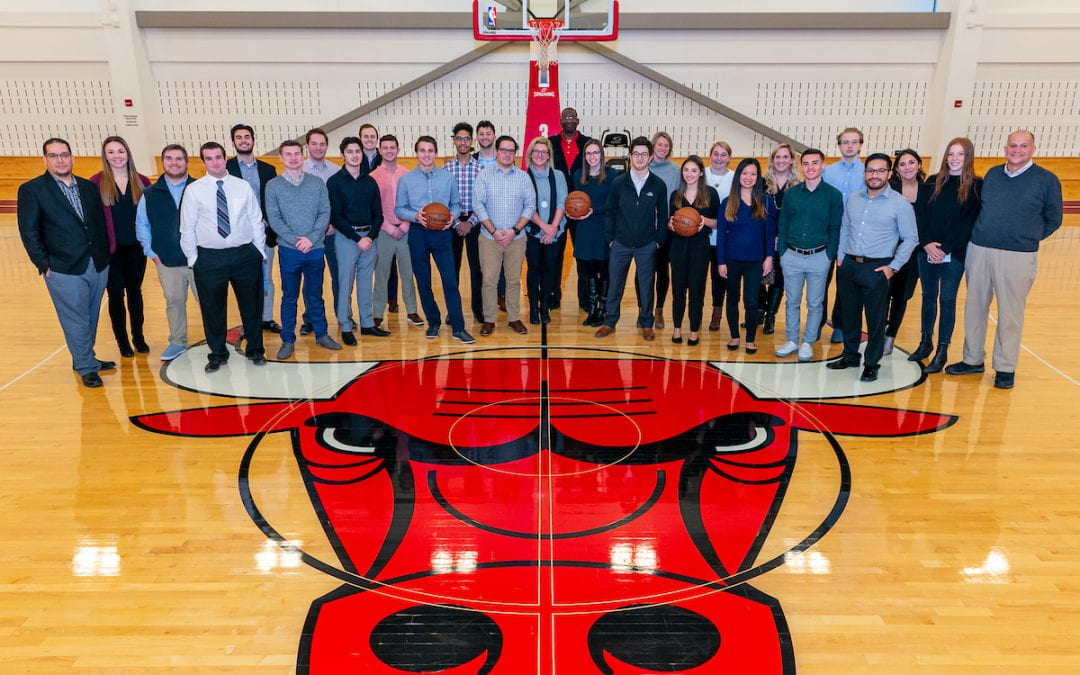
By Larissa Gojdycz | Photos by Kathy Hillegonds and Randall Spriggs
When I first read about the “Behind the Scenes with Chicago Sports Organizations” course, the only thing I could think of was sign me up. Then I realized that the class was one week long, Monday through Friday, so would require me to take time off from work.

The class attends a Blackhawks game at the United Center. (Photo by Randall Spriggs)
Being employed full-time while attending the MBA program at the Kellstadt Graduate School of Business is not uncommon for many students. Balancing work with graduate school is not easy. But after thinking it over, and realizing I could complete an otherwise 10-week course in a one-week time frame, I knew it would be worth it.
The week-long course ended up offering so much more than what I had expected. It was jam-packed with events ranging from speaking to a panel of DePaul alumni who work in sports to watching the Blue Demons men’s basketball team beat Texas Tech in overtime. When coworkers questioned why I took time off from work to go to class, I questioned why they wouldn’t take the time for a class like this.
Here are some highlights from the week:
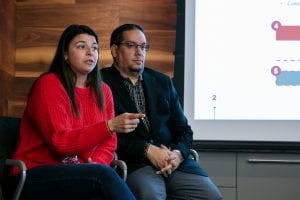
Jacqui Lorio, director of Guest Services for the Chicago Bulls, speaks to the students. (Photo by Randall Spriggs)
Meeting Chicago Sports Teams
Our class met and visited five major Chicago sports teams. That’s right, we went to the Bears, Blackhawks, Bulls, Cubs and White Sox offices and stadiums, where we met with the employees of each team and received tours of the facilities. One of my favorite tours was of the American Airlines 1914 Club at Wrigley Field, led by Cubs Senior Vice President of Sales & Marketing Colin Faulkner. A few years ago when the Cubs wanted to increase revenue without being able to add seats, they dug out the dirt from under the seats in the stadium and created three premier clubs. The 1914 Club was a sight to see. The Cubs designed the room to replicate the era of the 1910/1920s, with gold and sleek accents. The Chicago Cubs offers the 1914 Club to ticket holders in the section behind home plate, where they can access drinks and food and buy exclusive Cubs gear only available to that suite. It was amazing to see how a company was able to think out of the box to increase revenue without adding seats to a stadium.
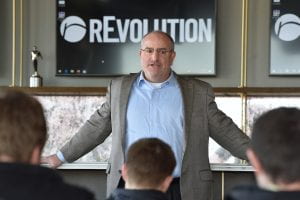
Students visit the Chicago headquarters of rEvolution, a sports marketing and media agency. (Photo by Kathy Hillegonds)
Visiting Sports Agencies and Companies
Another component of the sports industry we learned about was sports agencies and companies. Our class visited three agencies that deal directly with sports teams or companies that have sports sponsorships and/or relationships, like Gatorade, which was one of the companies we visited. We got to see the behind-the-scenes of how these agencies execute marketing campaigns for brands that want a sports integration or experience. Our class ended the week with a brainstorming session with the agency 4FRONT, which gave us some hands-on experience with the work they do and some interesting insights on how they do it.
Networking
Whether it was with the sports teams, agencies, brands or even fellow students in the class, meeting and networking with people was a definite highlight of this course. Over the week we met with more than 70 professionals in the sports space and were able to talk one-on-one with whomever we wanted to. It was invaluable being able to connect and chat with everyone. At the end of the week we had a round-table discussion panel with DePaul alumni who currently work in sports: Kacie Dohrmann of Northwestern Athletics; Mike Gordon of Learfield/Northwestern Sports Properties; Nick Bennett of the Blackhawks and Tim Weaver of the Wolves. We also met with three Kellstadt Graduate School of Business alumni, who were once students in this course: Max McNutt of Marketing Werks, Roger Uy of DePaul Athletics, and Graeme Jones of 4Front.

The class visits the White Sox at Guaranteed Rate Field. (Photo by Kathy Hillegonds)
On top of making connections with people during the site visits, I made many connections with students in the class. Many of us were in the same boat with our careers, so we were all very excited to be exposed to the number of people we got to meet as well as make connections among ourselves.
These highlights are just a small peek into the amazing and productive week I had with the “Behind the Scenes with Chicago Sports Organizations” course with Andy Clark, director of the sports management program at the Driehaus College of Business. The days were filled to the brim and we were always on the go, but the experience is something that will stick with me for the rest of my MBA journey, as well as career.
Larissa Gojdycz graduated from Marist College in New York with a bachelor’s degree in advertising. She works full-time as a media manager for a large retail company and is pursuing her MBA, with a focus on entrepreneurship, at the Kellstadt Graduate School of Business. Originally from northern New Jersey, she is still adjusting to Chicago winters, even though she’s lived in Chicago for five years.

By Dana Fitzmorris
Kellstadt’s Fall 2019 Career Conference on Nov. 2 did not disappoint. This event is hosted twice a year by the Career Management team at Kellstadt to provide an opportunity for students to network with business leaders in the Chicago community and gain career insights through workshops and panel discussions.
The conference kicked off with keynote speaker (and DePaul alumnus) Martin McGovern who talked about the realities of job searching. Martin is a coach at Career Therapy who helps clients with the emotional and promotional aspects of professional development. In his talk, Martin provided three helpful tips for graduate students when looking for jobs:
1. Focus on meeting people
The most valuable use of your time when job searching is connecting with individuals already working in your desired industry. Not only does this broaden your network, but also helps you understand job responsibilities with different companies. Most people are happy to share their experiences and help you learn.
2. Leverage your existing network
When applying for jobs, submitting your resume online should not be your only step. It is crucial to utilize your network and meet professionals face-to-face because personal relationships are typically what help you secure a job. Only 20% of people land a job from just an opening found online.
3. Maximize your use of LinkedIn
Many students create LinkedIn profiles once and never login again. This is a mistake. LinkedIn has extensive search capabilities to help find mutual connections with those working for a certain company or industry. By using the People Search feature on LinkedIn and expanding all filter options, you can generate search results based on granular criteria like past employers, geographic location and specialty services.
The second part of the conference involved three Q&A panel breakout sessions, where students could choose whichever session they found most applicable. The first session focused on using your graduate degree to advance your current career, the second talked about changing your career and the third was centered on careers in consulting. The panelists were honest and open with their responses to our questions, helping paint a clear picture about their industry and career expectations.
My favorite part of the Career Conference was receiving advice from the panelists about what grad students can be doing right now to prepare for the job market. Gaining applicable experience through internships, practicing interview skills with sample case problems and behavioral questions, and using DePaul alumni as resources were all tips they offered.
Kellstadt’s Career Conference helped me think about my career goals and develop a plan to reach them. One of my biggest takeaways was the importance of your network when job searching. The event supported this notion, as we were able to connect with Chicago employers and DePaul alumni at the breakout sessions. The Career Conference encouraged me to continue growing my professional network, and I am already looking forward to next year’s event.
Dana Fitzmorris graduated from Texas Christian University with a bachelor’s degree in finance and management. She is currently pursuing an MBA at DePaul, with a focus on entrepreneurship. She is co-founder of Kellstadt’s Women in Business student organization.
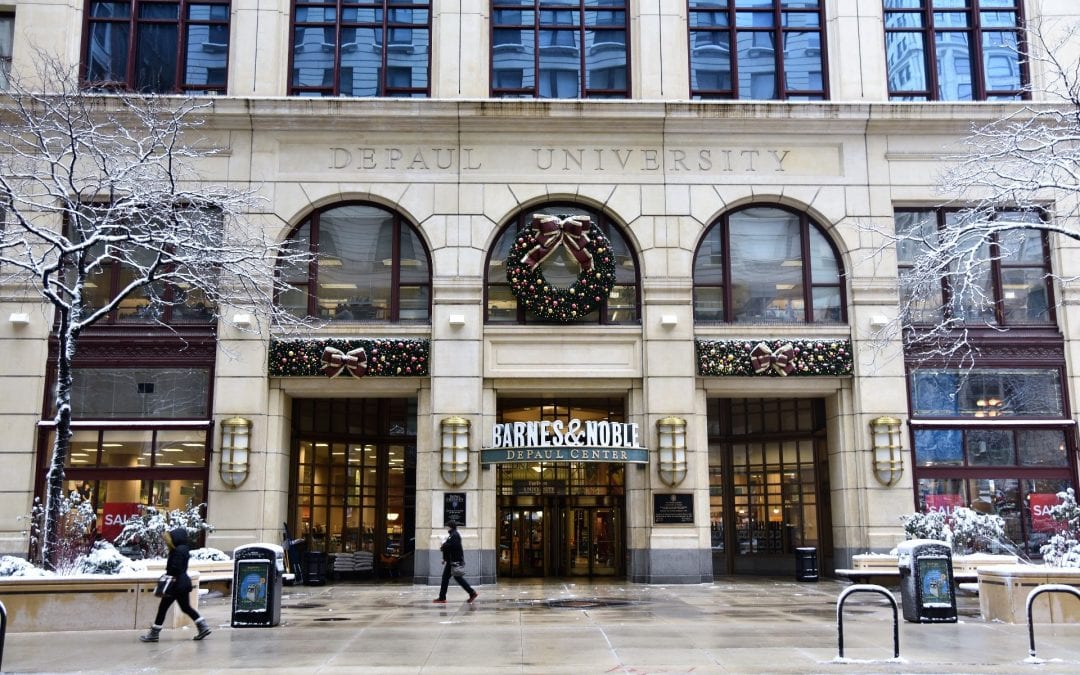
Now that the fall quarter has ended, Kellstadt students have the opportunity to enjoy the winter intersession before returning to campus in the new year. Some students opt to take a course during the winter intersession while others take the time to relax and recharge. Regardless of academic plans, Kellstadt students can still be spotted enjoying all that Chicago has to offer. Here are the top five activities where DePaul students can be found during this holiday season:
1. “Cohortsgiving” | The members of the full-time cohort brought together homemade dishes – traditional and non-traditional – to celebrate the Thanksgiving holiday. Two full turkeys were enjoyed among the celebration. In a toast, a full-time student noted being grateful for the newfound friendships within the cohort.
2. Chicago Holiday Events
- Christkindlmarket | This Chicago favorite includes an arrangement of traditional, festive German shopping and cuisine…all located in Downtown Chicago. Inspired by the Christkindlesmarkt in Nuremberg, Germany, enjoy a bit of Deutschland this holiday season.
- Lincoln Park ZooLights | See the Lincoln Park Zoo in a whole new light. Through Jan. 6, festive Christmas lights will be on display throughout the zoo.
- Catching the CTA Holiday Train | On the way to any of the above events, DePaul students will be chasing this festive train based on the schedule. Look for the “Season’s Greetings from the CTA” sign and catch a ride on one of the jovial cars.
3. DePaul Athletics Events | As avid sports fans, a number of current students plan to attend DePaul games during December. The Blue Demons men’s basketball team face Northwestern in a crosstown match-up at 11 a.m. on Saturday, Dec. 8.
4. Professional Reflection | Students can use the time off from classes to set themselves up for professional success in the remaining school year. A number of students plan to polish résumés and LinkedIn profiles as they reflect on New Year’s resolutions related to leadership, career development and professional goals. A few other ways to make the most of your time off include:
5. Rest, Relax, & Recharge | Make sure to also indulge in some R&R and self-care. Try a workout at The Ray Meyer Fitness and Recreation Center or a walk on the Chicago Lakefront Path.
Happy holidays!
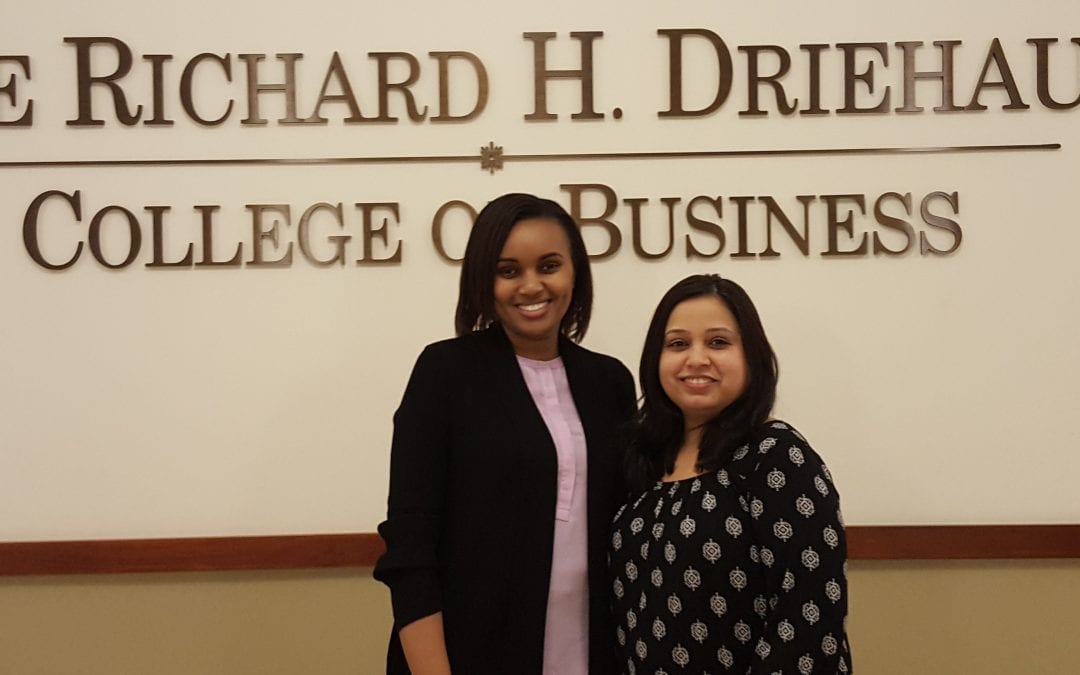
Making the decision to return to school can often be a difficult one, and even more so when a student chooses to attend an academic institution abroad. Three Kellstadt MBA students came together to reflect on their academic year as international students and the connections they formed with their classmates and faculty. Priscilla Mwaura, Shweta Gujrathi and Jing Liu selected DePaul University based on its strong academic reputation, but these students gained more than just an education–they discovered a community.
Mwaura chose to relocate from her home country of Kenya in part due to Chicago’s diverse economy and reputation as a top financial city. Kellstadt offered not only AACSB accredited classes, but also a faculty made up of industry experts and entrepreneurs well connected in the Chicago business community. Both were vital to Mwaura, who wanted to ensure that the MBA program she selected was reputable if she were to leave Kenya.
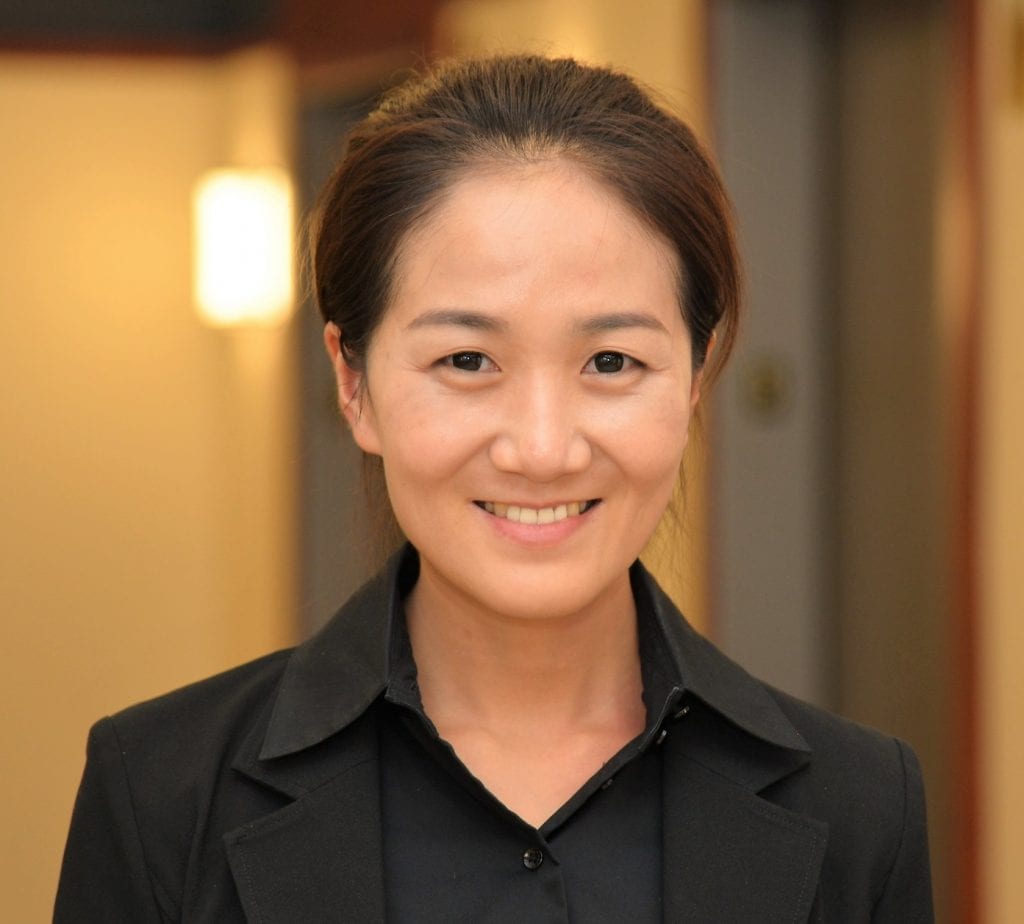
Jing Liu
Kellstadt’s financial reputation also attracted Liu. “Kellstadt has provided an international perspective,” Liu says. “Not only have I learned about the American economy, but also the economies of Northern Ireland and the United Kingdom through a study abroad trip.” For Liu, this professional knowledge has been invaluable. Liu continues, “I’ve been able to gain experience in some of the top financial industries and network with DePaul’s vast alumni network, helping to position me closer to achieving my career goals.”
Mwaura agrees that her first year at Kellstadt has broadened her outlook on global business, sometimes in surprising ways.“Some classes, such as MGT 584: Consulting Skills, developed my skill set in areas I knew little about before,” Mwaura says. “The learning environment at DePaul fosters teamwork and networking. Forming and sustaining these skills and relationships will directly impact the direction my career takes.”
Gujrathi found value not only in the academic resources, but also in the relationships she formed within the Kellstadt community. “The admissions team became my partners in the process even before I enrolled at DePaul, and I continue to receive the same support from the faculty and staff,” Gujrathi says. “Having someone to stand by you is particularly important for international students as they face various challenges in a new country.”
It has been a year full of education and networking for the three, and they look forward to finishing their degrees in 2019. With the support of the Kellstadt community they are positioned for success, whether in Chicago, or abroad.
Learn more about:
Contributors:
- Shweta Gujrathi is pursuing her MBA in Marketing full-time at Kellstadt Graduate School of Business
- Priscillia Mwaura is pursuing her MBA in Finance full-time at Kellstadt Graduate School of Business.
- Jing Liu is pursuing her MBA in Finance full-time at Kellstadt Graduste School of Business












Recent Comments